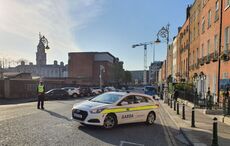I’ve been living in New York for over a year and half. Rarely have I ever felt homesick. But I did feel a twinge of homesickness this past Saturday because I spent a part of the day in an Irish bar, watching Ireland beat Wales in rugby.
The game was, to use an appropriate sporting cliché, nerve-wracking stuff.
Ireland were behind by half time, then came back and looked to have victory in their sights before Wales kicked a penalty to put them two points ahead with five minutes left in the game. With two minutes left in the game, the Irish team held its nerve and Ronan O’Gara scored a drop goal.
That looked like enough to win the game – but then Ireland stupidly gave away another penalty – which would literally be the last kick of the game.
The Welsh kicker, Stephen Jones, who hadn’t missed a kick all day, stepped up for the penalty and I thought that this would once again be another glorious Irish defeat – a bit like the Easter 1916 Rising.
Jones's kick had the direction, but not the distance, and the ball dropped short of the posts. I turned to the stranger beside me in a Manhattan bar and we hugged. Ireland won and, in doing so, completed the “Grand Slam” – beating the five other countries in the Six Nations tournament. This was their first Grand Slam in 61 years.
If you are not Irish, there’s a good chance you really won’t care about this game. Rugby is, after all, a small sport on a global scale.
But even if you are Irish, there’s still a good chance that you’ll be indifferent to the result of Saturday's game. As Tom Humphries, undoubtedly the best sportswriter in Ireland today, wrote in the London Times recently, a lot of Irish don’t care about rugby.
Rugby, Humphries says, is largely the preserve of the middle class in Ireland, in a way that soccer and the Gaelic Athletic Association – which involves the Irish sports of hurling and Gaelic football – aren’t. He adds that rugby fails to unite the country, in a way that soccer and the GAA can.
He has a point. In the Republic of Ireland, at least, there have been moments when the entire country seems to stand still when the soccer team is doing well. (The soccer World Cup finals in 1990 being the most notable example, when Ireland got through to the quarter finals.)
Humphries also says that rugby in Ireland is an elitist sport, played in exclusive fee-paying high schools such as Blackrock, Castleknock and Clongowes Wood.
That last one stung me a little, because I went to Clongowes. In fact, Gordon D’Arcy, who played for Ireland yesterday, was in my year. I’d like to say that I played rugby with him, but that would be stretching the truth. I can never even remember tackling him: from the moment he arrived in school, he played on the “A” team, while I floundered a whole two divisions below him on the “C” team. The best that could be said about my rugby playing ability is that I was one of the better guys who were completely useless.
When we were around 15, our year went on a rugby tour to Northern Ireland. This, I am pretty sure, would have been the first time in my life I ever spoke to a northern Protestant.
And this is the crucial point that Humphries misses. In Ireland, rugby is an all-island sport, in a way that GAA and soccer most certainly aren’t.
A couple of players in the winning Irish team yesterday are northern Protestants, who have tended to feature more prominently in the team in recent years.
I can’t think of any other sport in Ireland that unites North and South in this way. The GAA, for many years, did more to divide Protestants and Catholics in Northern Ireland than to unite them.
Up until the early 1970s, its members could have been kicked out of the organization for even playing so-called “foreign sports” of soccer and rugby.
Another one of its rules, which it has since relaxed, banned members of the British security forces from playing its games.
Even more ridiculous was another rule which banned the playing of “foreign games” on its grounds. (After much soul searching, it dropped this stupid rule in 2005, and allowed Croke Park, its magnificent Dublin stadium, to be used for rugby.) Its northern members were most resistant to this ban being relaxed.
The record of soccer is even worse. In a country as small as Ireland, you’d think it would make sense to have one soccer team and one soccer league.
But Ireland has two soccer organizations: the Football Association of Ireland (in the Republic), which is not to be confused with the Irish Football Association (which is in Northern Ireland).
This sounds like the difference between Monty Python’s Judean People’s Front and the People’s Front of Judea. But the divisions that soccer has perpetuated in Ireland are very real.
Although the Northern Ireland soccer team has in recent years tried to stamp out sectarianism, in the past it was a byword for anti-Catholic bigotry. In 2002, a Catholic player for Northern Ireland, Neil Lennon, retired from international soccer after receiving death threats from Protestant paramilitaries.
It would seem logical, given economies of scale, to have one mediocre Irish soccer team, rather than two lousy ones, as is the case at present. The idea of having an all-Ireland soccer team is discussed occasionally, but it looks very unlikely to happen.
Until that day comes, and until the GAA does more to reach out to northern Protestants, only rugby can get fans, Catholics and Protestants, on both sides of the border cheering for the same team.
Which is why Ireland’s amazing Six Nations victory belongs as much to the people of Belfast as it does to the people of Dublin.




Comments